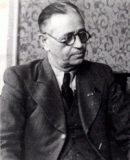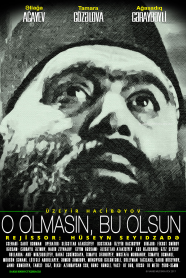
Uzeyir Hajibeyov
Uzeyir Hajibeyov
composer conductor, publicist, playwright, teacher, translator
Uzeyir Hajibeyov was born in Agjabadi in the Elisabethpol Governorate of the Russian Empire, which is now part of Azerbaijan. His father, Abdul Huseyn Hajibeyov, was the secretary to Khurshidbanu Natavan for many years, and his mother, Shirin, grew up in the Natavan household. Growing up, Hajibeyov was strongly influenced by Natavan's work.
Shusha, often dubbed as the cradle of Azerbaijani music and culture, had a reputation for its musical heritage. The town was also referred to as "the Music Conservatory of the Caucasus" because of its many talented musicians and singers. And the fact that Hajibeyov grew up in Shusha explains how at 22, in 1908, with very little formal musical education, he was capable of writing a full-length opera.
Huseyngulu Sarabski as the first Majnun in the opera Leyli and Majnun (Baku, 1908).
Hajibeyov received his early education in a religious school (madrasah), where he perfected his Arabic and Persian. Later he studied at a two-year Russian-Azerbaijani school. Here, with the help of his favourite teacher Mirza Mehdi Hasanzadeh, he familiarized himself with the heritage of the famous classic writers of the East and the West. The richness of the musical performance tradition of Shusha greatly influenced the musical education of Uzeyir Hajibeyov. He would later reflect on his experiences: "The first musical education I got as a child in Shusha came from best singers and saz-players. At that time I sang mughams and tasnifs. The singers liked my voice. They would make me sing and teach me at the same time." Uzeyir Hajibeyov's first teacher was his uncle Agalar Aliverdibeyov, an excellent connoisseur of Azeri folk music. In 1897–1898, when Azerbaijani playwright Abdurrahim Hagverdiyev and singer Jabbar Garyagdyoglu staged the episode Majnun on Leyli's grave from Leyli and Majnun, 13-year-old Uzeyir sang in the choir.From 1899 to 1904 Uzeyir Hajibeyov studied at the Gori Pedagogical Seminary. There, along with general education, he also acquired music. In this school Hajibeyov learned to play the violin, the violoncello and the brass instrument. After his graduation from the Pedagogical Seminary, Uzeyir Hajibeyov was appointed a teacher to the village of Hadrut in Upper Karabakh. Having worked there for a year, Hajibeyov permanently settled in Baku, where he carried on his career in teaching mathematics, geography, history, Azeri and Russian languages, and music. He wrote the Turkic-Russian and Russian-Turkic Dictionary of Political, Legal, Economic and Military Terms, Used in Press in 1907 and the textbook Arithmetic Problems in 1908, and had them published by the Orujov Brothers Publishing House in Baku.
Hajibeyov was no stranger to the tragic chaos of war; he lived through the Revolutions of 1905 and 1917, the fall of the Democratic Republic of Azerbaijan in 1920, and both World Wars. The political repercussions of these military conquests often manifested in other forms of chaos. For example, between 1920 and 1940, the alphabet systems for writing Azeri were changed three times — from Arabic to Latin, and from Latin to Cyrillic — a process which greatly hindered and interrupted the educational and cultural process and may well have been one of the factors influencing Uzeyir Hajibeyov to present his ideas verbally on the musical stage.
In 1908, Hajibeyov wrote his first opera, Leyli and Majnun, based on the tragic love story by the 15th century poet Fuzûlî. This would be the first of 7 operas and 3 musical comedies that Hajibeyov would compose throughout his life. In Leyli and Majnun, the uniqueness of the traditional modal music of mugham was incorporated into a Western genre with the use of instruments indigenous to both traditions.
Hajibeyov's second opera Sheikh Sanan was written in 1909 in a form that was entirely opposite to the first. This time Hajibeyov employed a purely European style. Sheikh Sanan received raves as a musical composition, but the content was too progressive for the period. In this opera, Hajibeyov advocated that marriage should not be bound by nationality or religion - in essence, it was another form of integration. But this time, it backfired. The story line follows a religious sheikh on his way to Mecca who meets a very beautiful Georgian lady. To his horror, the lovely creature's father turns out to be a swineherd, caring for what, to him, was a forbidden animal. In the end, the sheikh denounces his religion to win the woman. It is said that when the opera was performed, many people were offended and walked out, leaving Hajibeyov with the realization that he had outpaced his generation too much this time. As a result, he made a drastic decision and burned the score. When asked by Ramazan Khalilov, his assistant, how he could do that, Hajibeyov replied: "I didn't destroy my opera. It's my own creation so it's always in my head." Khalilov said that Hajibeyov went on to use this same magnificent music 27 years later to create Koroğlu, an opera that many acclaim to be his finest.
In contrast to Sheikh Sanan, Hajibeyov's operas Rustam and Sohrab (1910), Asli and Karam (1912), Shah Abbas and Khurshid Banu (1912), and Harun and Leyli (1915) were entirely based on Azeri folk music elements, primarily mugham.
In October 2006, the musical comedy Arshin Mal Alan ("The Cloth Peddler") by Uzeyir Hajibeyov, written in 1913, was announced to be performed on western stages for the first time.
A poster of "Arshin Mal Alan" at Femina theatre of Paris in 1925.
One of Hajibeyov's greatest legacies was bringing forward the idea of establishing a professional music school. Hence the Baku Academy of Music (known then as the Azerbaijan State Conservatoire), was founded in 1920 and named after Hajibeyov after his death. The school has trained Azerbaijan's finest composers such as Gara Garayev, Fikrat Amirov, Jovdat Hajiyev, Soltan Hajibeyov, Tofig Guliyev, and Vagif Mustafazade. His statue "sits" in front of this grand building that is still devoted to the synthesizing Eastern and Western musical traditions.
In 1931, Hajibeyov helped in establishing the Azeri Folk Instruments Orchestra affiliated with the Radio Committee. This orchestra performed European classical pieces, such as those by Mikhail Glinka, Wolfgang Amadeus Mozart, Franz Schubert, Georges Bizet and others. Hajibeyov thus was the first musician to adapt the note system to traditional Azeri musical instruments.
In 1936, Hajibeyov assisted in founding of the Azerbaijani State Choir within the Azerbaijan Philharmonic Society. One of the most serious problems he faced was the mono-voiced repertoire of Azeri folk songs, which allowed harmonization distort style of the song and, on occasion, even alter the melody line when it changed modes. Hajibeyov resolved this problem by using contrapuntal polyphony and unison-doubling rather than four-part singing in the problematic sections.
Hajibeyov devoted much energy to the idea of integrating woman's role and status into the male-dominated world. The concept of women's emancipation runs through many of his works often in the form of comedy or satirization as in the case when he makes fun of the process of selecting marriage partners, a process hindered by the fact that women were still wearing veils until the 1920s when the Soviet regime prohibited them.
